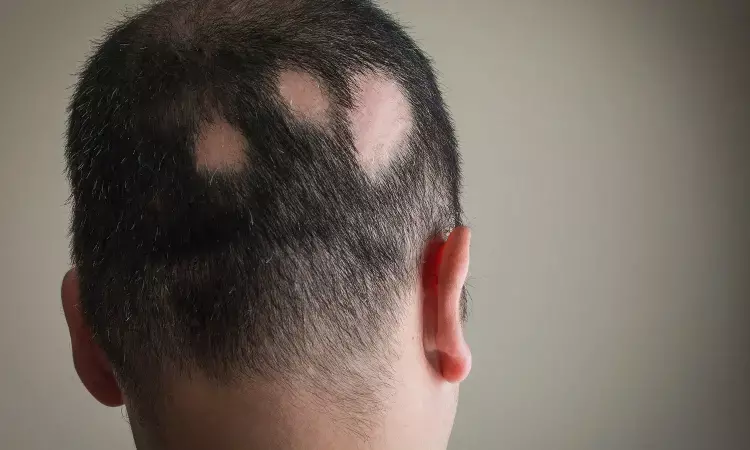- Home
- Medical news & Guidelines
- Anesthesiology
- Cardiology and CTVS
- Critical Care
- Dentistry
- Dermatology
- Diabetes and Endocrinology
- ENT
- Gastroenterology
- Medicine
- Nephrology
- Neurology
- Obstretics-Gynaecology
- Oncology
- Ophthalmology
- Orthopaedics
- Pediatrics-Neonatology
- Psychiatry
- Pulmonology
- Radiology
- Surgery
- Urology
- Laboratory Medicine
- Diet
- Nursing
- Paramedical
- Physiotherapy
- Health news
- Fact Check
- Bone Health Fact Check
- Brain Health Fact Check
- Cancer Related Fact Check
- Child Care Fact Check
- Dental and oral health fact check
- Diabetes and metabolic health fact check
- Diet and Nutrition Fact Check
- Eye and ENT Care Fact Check
- Fitness fact check
- Gut health fact check
- Heart health fact check
- Kidney health fact check
- Medical education fact check
- Men's health fact check
- Respiratory fact check
- Skin and hair care fact check
- Vaccine and Immunization fact check
- Women's health fact check
- AYUSH
- State News
- Andaman and Nicobar Islands
- Andhra Pradesh
- Arunachal Pradesh
- Assam
- Bihar
- Chandigarh
- Chattisgarh
- Dadra and Nagar Haveli
- Daman and Diu
- Delhi
- Goa
- Gujarat
- Haryana
- Himachal Pradesh
- Jammu & Kashmir
- Jharkhand
- Karnataka
- Kerala
- Ladakh
- Lakshadweep
- Madhya Pradesh
- Maharashtra
- Manipur
- Meghalaya
- Mizoram
- Nagaland
- Odisha
- Puducherry
- Punjab
- Rajasthan
- Sikkim
- Tamil Nadu
- Telangana
- Tripura
- Uttar Pradesh
- Uttrakhand
- West Bengal
- Medical Education
- Industry
Up-titration of baricitinib may improve hair growth among patients with severe alopecia areata : JAMA

USA: A pooled analysis of the BRAVE-AA1 and BRAVE-AA2 trials revealed that severe alopecia areata patients not achieving successful regrowth of scalp hair with baricitinib, 2 mg, may benefit from up-titration to baricitinib, 4 mg.
The findings published in JAMA Dermatology showed that up-titration of baricitinib, 2 mg, to baricitinib, 4 mg, in patients who did not respond to the 2 mg dose led to meaningful improvement of response rates over the subsequent 24 weeks for eyebrow, scalp, and eyelash hair loss.
Baricitinib, an oral selective Janus kinase 1/2 inhibitor, has been shown to achieve clinically meaningful outcomes for eyebrow, scalp, and eyelash hair regrowth in patients with severe alopecia areata (AA) at 36 weeks of treatment. Treatment with 4 mg baricitinib has resulted in higher response rates than 2 mg baricitinib at weeks 36 and 52.
Justin M. Ko, Stanford University School of Medicine, Stanford, California, and colleagues aimed to determine the efficacy of up-titration of 4 mg baricitinib for 24 weeks in patients who had previously not responded to 2 mg baricitinib (Severity of Alopecia Tool score of >20).
BRAVE-AA1 and BRAVE-AA2 are placebo-controlled, multicenter, phase 3 randomized clinical trials (RCTs) that were initiated on September 24, 2018, and July 8, 2019, respectively, with follow-up to 200 weeks. The pooled analysis reports long-term extension data up to week 76.
The study included 1,200 adult patients with severe alopecia areata. They were randomly assigned in a ratio of 3:2:2 to receive baricitinib, 4 mg; baricitinib, 2 mg; or placebo. Patients treated with baricitinib remained on the same treatment dose until week 52. Patients were considered nonresponders to baricitinib, 2 mg if they had a SALT score higher than 20 after 52 weeks of therapy.
The analysis was done of the proportions of patients achieving a SALT score of 20 or below and clinician-reported outcomes for eyelash hair loss and eyebrow hair loss of 0 or 1 (minimal gaps or full coverage) with 2-point or higher improvements from baseline (among those with baseline scores ≥2 [significant gaps to no notable hair]) through week 76.
The authors reported the following findings:
- At week 52, of the 340 patients (mean age, 38.4 years; 62.4% were females) treated with baricitinib, 2 mg, 62.4% had a SALT score higher than 20 and were up titrated to baricitinib, 4 mg.
- Two-thirds of these patients (67.0%) had a baseline SALT score of 95 to 100, indicating very severe AA.
- At week 76, 25.9% of patients had achieved a SALT score of 20 or lower.
- During the same period, response rates for clinician-reported outcome scores of 0 or 1 increased from 19.3% to 37.9% for eyebrows and from 24.1% to 40.9% for eyelashes.
"Severe alopecia areata patients not achieving successful regrowth of scalp hair with baricitinib, 2 mg, may benefit from up-titration to baricitinib, 4 mg," the researchers concluded.
Reference:
Ko JM, Mayo TT, Bergfeld WF, et al. Clinical Outcomes for Uptitration of Baricitinib Therapy in Patients With Severe Alopecia Areata: A Pooled Analysis of the BRAVE-AA1 and BRAVE-AA2 Trials. JAMA Dermatol. 2023;159(9):970–976. doi:10.1001/jamadermatol.2023.2581
Dr Kamal Kant Kohli-MBBS, DTCD- a chest specialist with more than 30 years of practice and a flair for writing clinical articles, Dr Kamal Kant Kohli joined Medical Dialogues as a Chief Editor of Medical News. Besides writing articles, as an editor, he proofreads and verifies all the medical content published on Medical Dialogues including those coming from journals, studies,medical conferences,guidelines etc. Email: drkohli@medicaldialogues.in. Contact no. 011-43720751


